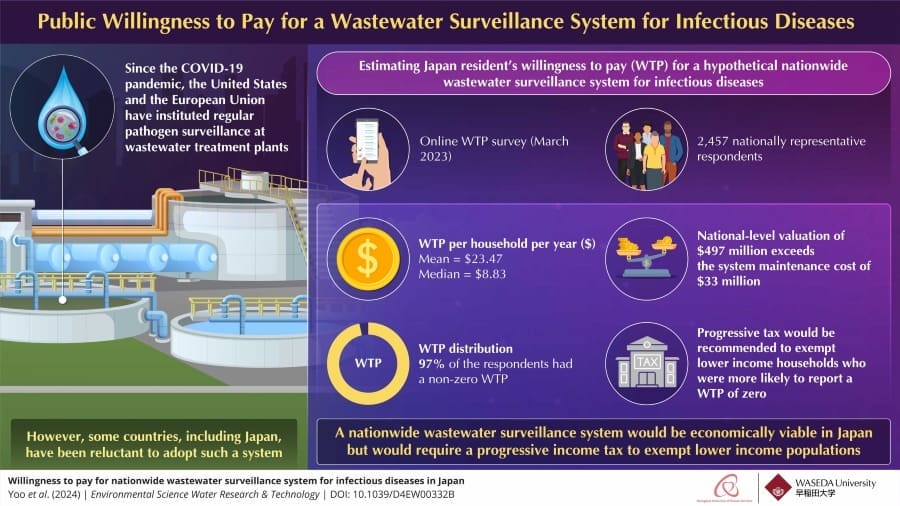Globally, the COVID-19 pandemic and the increased likelihood of other such outbreaks in the future warrant the strengthening of epidemic surveillance systems. Among these, continuous wastewater surveillance at wastewater treatment plants is considered more advantageous for understanding the community-level disease dynamics, as compared to clinical surveillance.
This is because such a continuous system captures the epidemic status of a larger population without any selection bias and provides higher testing capacity even during an outbreak. Moreover, such a system is relatively inexpensive.

Consequently, the USA and most countries in the European Union have established regular wastewater surveillance in their cities after the beginning of COVID-19 pandemic. However, many other countries, including Japan—where less than 20 cities implement wastewater monitoring for epidemic data—are still reluctant to adopt this system nationally.
This raises the question of whether a nationwide wastewater surveillance system for infectious diseases would be economically worthwhile in Japan. While cost-benefit analysis or return over investment (ROI) can help evaluate the system’s economic efficiency, it is also important to understand the population’s willingness to pay (WTP) for such a system in order to determine the budget allocations.
Understanding the public’s WTP can also provide much-needed economic information for spearheading future discussions from a policy perspective. Consequently, a survey-based study led by Professor Byung-Kwang Yoo, from the Faculty of Human Sciences at Waseda University and the Graduate School of Health Innovation at Kanagawa University of Human Services, estimated Japan resident’s WTP for a hypothetical nationwide wastewater surveillance system for infectious diseases.
Explaining the rationale further, Prof. Yoo says, “Providing economic information to stakeholders can support the rationale behind implementing or continuing large-scale pathogen surveillance at wastewater treatment plants. For a potential future epidemic with uncertain risks, accurately simulating or predicting the wastewater surveillance system’s ROI tends to be challenging. However, estimating the WTP elicited from taxpayers can overcome this challenge.”
The findings of this study were published in Environmental Science: Water Research & Technology on 30 May 2024. The article was co-authored by Professor Rei Goto from Keio University, Professor Masaaki Kitajima from the University of Tokyo, Dr. Tomoko Sasaki, an independent consultant, and Dr. Sebastian Himmler from the Technical University of Munich.
For their study, the researchers conducted a large-scale online survey with a nationally representative sample of 2,457 people in Japan and gauged their WTP using the contingent valuation method.
The results of the survey suggested that around 97% of the respondents replied with a non-zero WTP. While the mean WTP was estimated to be USD ($) 23.47, the median was $8.83 per household per year for establishing and maintaining a regularized nationwide wastewater surveillance system. Using the median value, the national monetary valuation aggregate was $497 million, which was more than the estimated potential costs for system maintenance ($33 million). In fact, the aggregated WTP would also be able to support broader applications of wastewater surveillance at major international airports in Japan.
Moreover, the survey revealed that the major predictors for WTP were income, education, age, and higher levels of awareness of disease outbreaks. Specifically, lower-income individuals/households were more likely to report a WTP of zero, and people over the age of 47 were more likely to report a higher WTP.
All in all, these results imply that most residents in Japan value a nationwide wastewater surveillance system and are willing to pay an additional annual tax of $8.83 for it, making the system economically justified for the country. To fund such a system and ease the burden off lower-income individuals/households, the researchers recommend a progressive income tax that exempts them from payments.
Concluding with the potential implications of these findings, Prof. Yoo says, “Our findings can inform and encourage Japan and other countries to launch or expand wastewater surveillance systems for infectious diseases. Governments can use our study as a guidance for policy decision and budget allocations for such a system. Moreover, even the USA and the EU can leverage our WTP study to justify the operations of their wastewater surveillance systems to their citizens.”
***
About Waseda University
Located in the heart of Tokyo, Waseda University is a leading private research university that has long been dedicated to academic excellence, innovative research, and civic engagement at both the local and global levels since 1882. The University has produced many changemakers in its history, including nine prime ministers and many leaders in business, science and technology, literature, sports, and film.
About Professor Byung-Kwang Yoo
Byung-Kwang Yoo is a tenure-track Professor at the School of Human Sciences, Waseda University. He specializes in the areas of health economics and health evaluation science with his current research focus being on the public health measures against large-scale infectious diseases and health education using theater techniques. For his works in these themes, Prof. Yoo has been recognized as an innovator in Waseda University’s Innovators: Research Recap for 2024. He has also conducted a workshop on “Improvisation on the Health and Wellbeing of Stateless People” along with Prof. Jon Rossini from the University of California Davis for Waseda University’s International Symposium: Understanding Human Rights of Stateless People in the Real-life Context in the Asia Pacific.
More information: Byung-Kwang Yoo, Rei Goto, Masaaki Kitajima, Tomoko Sasaki and Sebastian Himmler, ‘Willingness to pay for nationwide wastewater surveillance system for infectious diseases in Japan’, Environmental Science: Water Research & Technology (2024); DOI: 10.1039/D4EW00332B | WU Press Release/Material. Featured image credit: kjpargeter | Freepik




